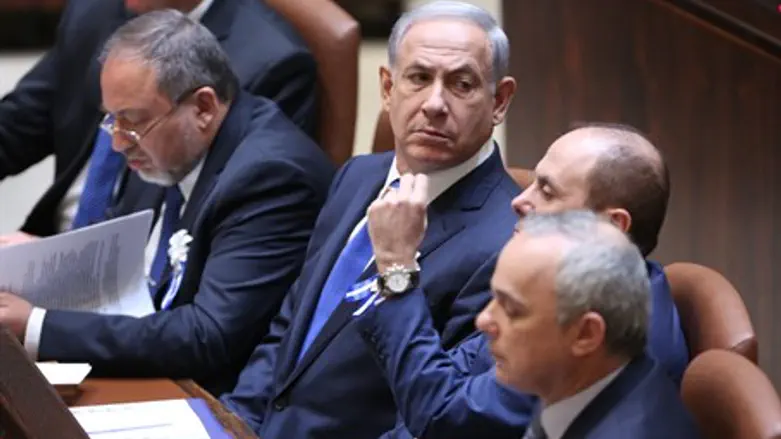
Prime Minister Binyamin Netanayhu addressed the swearing-in ceremony of the 20th Knesset on Tuesday, using the occasion to warn against the Iran nuclear deal being formulated with world powers in Switzerland's Lausanne ahead of a deadline this Tuesday.
"The greatest threat to our security and to our future was and remains Iran's effort to arm itself with nuclear weapons," emphasized Netanyahu. "The agreement being formulated in Lausanne paves the way to this outcome. ...We will do everything to protect our security and our future."
Outlining the highly secretive deal being crafted, Netanyahu stated "it seems that it will leave in Iran's possession underground installations, the nuclear reactor at Arak and advanced centrifuges, the same things that only a few months ago we were told - and rightly so - were not essential to a nuclear program designed for peaceful purposes."
As pointed out by Netanyahu, Israel has noted 17 states have peaceful nuclear programs and none of them enrich uranium, which Iran is demanding to be allowed to continue doing with its centrifuges. Likewise Arak and the underground facilities are thought to be being used for developing nuclear weapons technology, a suspicion heightened by Iran's secretive guarding of the facilities.
"Iran's breakout time for achieving fissile material for nuclear bombs will not be measured in years, as was said at the outset; in our assessment the time has been reduced to less than a year, probably much less," warned Netanyahu.
"And all of this is before taking into account the ballistic missiles that Iran is continuing to manufacture, the ongoing development of advanced centrifuges, Iran's obdurate refusal to reveal to the IAEA (International Atomic Energy Agency) its activities to develop nuclear weapons," he added.
The prime minister also pointed out "Iran's campaign of conquest and terrorism – which is open to all, everyone sees it, before our very eyes – from the Golan Heights to Yemen, from Iraq to Gaza and so many other places."
Iran is exerting its regional influence via terror proxies in numerous states, including Lebanon through the Hezbollah terrorist group, Yemen with the Shi'ite Houthi rebels, Iraq through Shi'ite militias, and Syria with its own troops and Hezbollah.
Netanyahu said most Arab states shared Israel's concerns regarding a nuclear-armed Iran fueling a regional nuclear arms race, saying "they understand the Iranian threat, the share our perspective on other threats from extremist Islamist elements."
"This also creates opportunities," he stated. "I hope this cooperation between Arab states and us will help us advance peace with our Palestinian neighbors."
Even as nuclear talks were reaching a conclusion on Tuesday, Commander of Iran’s Basij (volunteer) Force, Brigadier General Mohammad Reza Naqdi, said “wiping Israel off the map is not up for negotiation.”
